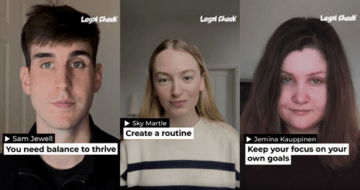Future trainee Anuja Venkataramani offers advice to lawyer hopefuls

Every autumn, law firms in the UK receive thousands of vacation scheme applications from students aspiring to secure a training contract and start their legal career. Those high-pressure months can feel daunting and it’s easy to agonise over whether you’re doing too little or spreading yourself too thin.
Having been there and done that, I accepted a training contract offer from the London office of a US law firm last summer, just after finishing my undergraduate law degree. Here, I’m sharing five tips that I found helped me along the way, and might be a good sounding board for others starting the application process in the coming months.
1. Don’t rush
I spent most of second year just trying to understand the subjects on my degree — I’m still not quite sure I succeeded at doing that with trusts law! Meanwhile, it seemed that everyone around me was feverishly applying to vac schemes, going to commercial awareness webinars and knew exactly which law firm they wanted to start their career in and why.
I still had no idea if I wanted to go down the barrister or solicitor route. Of course, it was hard not to get caught up in the rush everyone else was in, so I sent out a couple of vac scheme applications just to try my luck. Naturally, they didn’t work out — I read them back now and realise I had no idea what I was talking about.
The point is, everyone works on a different timeline. If you can attend law fairs and firm dinners in your first year, and have your mind made up by the start of second year, that’s great. But equally, if you need time to settle into university and think about your options, then take your time. For instance, I had to do a mini-pupillage to realise that the barrister path wasn’t quite right for me — and no, a law firm is not going to frown upon that. It’s perfectly reasonable to want to explore different aspects of a field you want to build a career in.
When people around you are applying for vac schemes and you still aren’t quite sure what you want to do, it’s easy to feel like you’re behind. That just isn’t true. People seeking out training contracts are often in vastly different stages of their life. Some are switching over from a whole other career, some have been trying out different aspects of the legal industry before deciding they want to go down the solicitor route.
It helps to have this perspective to appreciate that it’s probably unrealistic to have laser-focused clarity when you’re just 19 or 20 years old. It is, by no means, a disadvantage to need some more time to make up your mind. If anything, this can work in your favour, because your response to the inevitable “why do you want to be a solicitor” question is likely to be authentic and well-considered.
2. It’s not ‘take what you can get’
Don’t fall into the trap of applying to 30 different law firms in the three or four months that vac scheme and training contract applications tend to be open for. The likelihood is that you will get exhausted halfway through and just start recycling what you’ve already submitted.
Instead, use the summer prior to the application season to research different firms and think about what appeals to you and fits in with your personality. Do you thrive in a more relaxed or a fast-paced work environment? Is it important to you to spend time working abroad? Are you someone that prefers structured training or learns best by figuring things out yourself and asking questions? What industry or sector do you find interesting?
Once you know what your priorities are, you’ll know which law firms fit in with that, and those are the only ones you should apply to. If you’ve been prudent with your selectiveness, this should work out to about eight to ten different firms. Research these in more detail, go to any events they are present at and ask questions to gauge whether it’s the sort of environment you would be happy in.
It’s easy to get so caught up in applications that you see securing a training contract as the end. True, it’s what you’re working towards, but you need to think beyond just that to considering how you would feel to actually work at that firm for those two years (at the very least). The benefit of this is that you’re likely to understand each firm you’re applying to in greater depth and have more convincing reasons for why you’d like to be there, which is ultimately what graduate recruitment is looking for.
3. The commercial awareness conundrum
Becoming ‘commercially aware’ for your applications, interviews and assessment days can be intimidating, because naturally, you can never know enough. Of course, the associate or partner who has been working in the industry for several years is going to know more than you will. But no one is holding you to that standard. What matters is that you have an understanding of trends within the spaces that the law firms you are applying to operate within and can discuss these from different perspectives.
What I found helped for me was listening to the BBC Global News and Financial Times podcasts most mornings. They’re free, easily available and take up about 30 minutes of your time. The more you listen to these, the more you start to recognise links and threads — it helps to think of the news as a story, with new developments every day.
I didn’t find that I had time to make notes about what I listened to, but if you’re consistent with this small addition to your routine, you will tend to remember how things have progressed over time as you add small chunks of information every day.
Try not to listen to these news stories passively. Think about them for a few minutes and consider why a law firm you are applying to might be interested in them. A short mental SWOT analysis (Strength, Weakness, Opportunity, Threat) is a helpful way to structure your thoughts around it. So, when it comes to writing about a recent sector development in your application or completing a task for an assessment centre, you’ll find that you not only have the knowledge from keeping up with the news, but can also analyse it contextually, which is key.
4. The interview(s)
You will almost certainly have one, or multiple, interviews as part of the assessment centre prior to a vac scheme. You might also have interviews towards the end of the vac scheme process to determine whether you are made a training contract offer. Interviews tend to be a major source of intimidation for most students, and reasonably so. There’s no doubt that it’s daunting to be discussing the law and your interests with practising legal professionals. It helps to separate out two aspects of most interviews.
There’s the general part, where you are likely to be asked “why this firm”, “why the solicitor route” and questions about your time on the vac scheme (if an exit interview). Think about these in good detail in advance. If you know you’re going to have an interview at the end of a vac scheme, make a list of the tasks you do each day, and spend some time picking out what you found most interesting and what you learnt from them, so you can discuss these at interview.
There’s also the more technical part, where commercial awareness is likely to come into play. Spend some time before the interview thinking about news developments that might be important to the firm, and a range of viewpoints from which you can evaluate these.
It’s also helpful to demystify the interview(s) by thinking about it as just a conversation. For those 30 minutes or so, try to put it out of your mind how much you may want the vac scheme or training contract. Just focus on calmly answering the questions you’re asked, and remember that you too can ask questions at the end of the interview.
5. The vac scheme
Get to know people and be forthcoming. If you attend a presentation and hear a trainee or associate discuss an area of law you think you might be interested in, drop them an email and ask them if they are free to grab a coffee. Most of the time, they will be happy to oblige and you’re likely to learn a lot from even a 15-minute conversation.
It’s also important to strike the right balance between asking questions and thinking independently. There’s nothing wrong with clarifying doubts, and it’s probably necessary if you’ve been given a completely new task. But try to do so by first thinking about how you might approach it and then asking whether you’re on the right track. This shows that you’ve engaged with the problem yourself before looking for guidance, rather than expecting a spoon-fed solution.
Anuja Venkataramani joined Legal Cheek as an editorial assistant in July 2023. She studied law at Durham University, later completing a Bachelor of Civil Law (BCL) at Oxford University, and is soon to start a training contract at a US firm’s London office.


